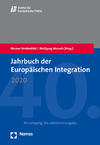Publications (selection)

Peter Hilpold, Andreas Raffeiner, Walter Steinmair (Hg.)
Rechtsstaatlichkeit, Grundrechte und
Solidarität in Österreich und in Europa
Festgabe zum 85. Geburtstag von Professor Heinrich Neisser, einem europäischen Humanisten
Über ein halbes Jahrhundert hat Professor Heinrich Neisser auf europäischer und auf nationaler Ebene die Entwicklung der Rechtsstaatlichkeit, des Grundrechtsschutzes und solidarischer Vorkehrungen begleitet und an vorderster Front mitgestaltet: als Wissenschaftler, als Politiker, als Exponent der Zivilgesellschaft.
Zu seinem 85. Geburtstag erscheint eine Festschrift, die mit über 100 Beiträgen Zeugnis liefert von der großen Wertschätzung, die ihm grenzübergreifend entgegengetragen wird
facultas 2021, 1.946 Seiten, gebunden
ISBN 978-3-7089-2069-6
Erhältlich im Buchhandel und auf facultas.at

Wolf, Michael C. (2021): Über Umwege zum Agenda-Setter? Zum normativen Stellenwert der Initiativentschließungen des Europäischen Parlaments, in: Peter Hilpold, Andreas Raffeiner, Walter Steinmaier (Hg.): Rechtsstaatlichkeit, Grundrechte und Solidarität in Österreich und Europa. Wien: Facultas, S. 637-662.
Beiträge in periodischen Werken:

Weidenfeld, Werner; Wessels, Wolfgang; Tekin, Funda (eds.):
Europa von A bis Z. Taschenbuch der europäischen Integration. Wiesbaden: VS Verlag für Sozialwissenschaften (former Baden-Baden: Nomos).
Maurer, Andreas: Beschäftigungspolitik | Europäische Parteien | Europäisches Parlament | Wahlen zum Europäischen Parlament
Umbach, Gaby: Umwelt- und Klimapolitik

Dialer, Doris; Walli, Thomas: Europäischer Wirtschafts- und Sozialausschuss
Maurer, Andreas: Das Europäische Parlament
Umbach, Gaby: Umwelt-, Klima- und Meerespolitik
Große Hüttmann, Martin; Wehling, Hans-Georg (eds.): Das Europalexikon. Begriffe | Namen | Institutionen. Bonn: Bundeszentrale für politische Bildung.
Maurer, Andreas: Ausschuss der Ständigen Vertreter | CEPT - Conférence Européenne des Administrations des Postes et des Télécommunications | Delegierte und Durchführungsrechtsakte | Einheitliche Europäische Akte (EEA) | Europäische Parteien | Europäischer Auswärtiger Dienst | Europäischer Rat | Europäisches Parlament | EUROVISION | Gemeinsame Handelspolitik | Interinstitutionelle Abkommen (bzw. Vereinbarungen) | Internationale Abkommen | Komitologie | Konferenz der Europaausschüsse der nationalen Parlamente (COSAC)

New Article: "Politicisation and economic governance design" by Fabio Franchino and Camilla Mariotto in: Journal of European Public Policy, Published online: 25 Feb 2020 (Link)

Heidlmayr-Chegdaly, Ingrid: Technocratisation and Depoliticisation of Democracy Promotion and Development Aid, The European Union and the African Development Bank in Morocco
Europawissenschaftliche Reihe, Band 7
2020, 281 S., Broschiert,
ISBN 978-3-8487-6637-6
Nomos (In Gemeinschaft mit IUP (innsbruck university press))
In the last decades the promotion of democracy and governance became a major component of western governments’ and multilateral organisations‘ foreign policies. Gradually external democracy promotion became a vast field of research in political science and transformation studies. While much scientific research focuses on instruments and strategies of multilateral donor institutions, such as the World Bank (WB), International Monetary Fund (IMF) and the European Union (EU), the African Development Bank Group (AfDB) is to date subject to few researches. The thesis offers new empirical insights into actors‘ implementation and strategies of development and political aid to Morocco, with a strong focus on the actors‘ orientation, identity and will and contributes to a more systematic research on non-western actors‘ role in external aid. The focus lies on the different conceptualisation and implementation of EU and AfDB democracy and governance assistance regarding the donors‘ operational and strategic orientations. Morocco was chosen as an appropriate country cases study, because the country is the largest recipient of EU bilateral aid within the framework of the European Neighbourhood Policy (ENP) and the most important regional client of the AfDB. The thesis demonstrates that donors adopt technocratic approaches and understandings of democracy and governance. Consequently, objectives of democracy and governance promotion are conflicting or competing and political aid, including democracy and governance promotion, becomes more technocratic and depoliticised. Thus, the actors‘ orientation and modes of interaction limit the implementation of external political aid to a technical-operational level.

Walli, Thomas: Die Strategie der Vernetzung
Die interinstitutionellen und externen Beziehungen des Europäischen Wirtschafts- und Sozialausschusses
Europawissenschaftliche Reihe, Band 6
2020, 162 S., Broschiert,
ISBN 978-3-8487-6655-0
Nomos (In Gemeinschaft mit IUP (innsbruck university press))

New Award: "Building something beautiful with stones: How regions adapt to, shape and transform the EU opportunity structure" by Melanie Plangger in: Regional & Federal Studies, Published online: 26 Jul 2017 (Link)
⭐ Awarded with the 2019 Best Article Prize
Study: Activating good governance and citizen engagement in the EUSALP
The involvement of non-state actors in the EU macro-regional strategy for the Alpine region
Melanie Plangger, PhD and Prof. Dr. Andreas Maurer
Governance Study on Mobility and Transport in the EUSALP
by Prof. Dr. Andreas Maurer, Melanie Plangger PhD, Kief Albers, Luca Clavadetscher, Anna Santolin, Philipp Umek
The EUSALP Strategy brings together seven countries, of which five are EU Member States (Austria, France, Germany, Italy and Slovenia) and two are EFTA (European Free Trade Association) countries (Liechtenstein and Switzerland). From a subnational perspective, EUSALP is a platform for cooperation for 48 regions. EUSALP is implemented by nine EUSALP Action Groups (AG), which organise their operations thematically along the four key objectives of the macro-regional strategy. The EUSALP Action Plan outlines the four objectives and the nine actions of cooperation.
Within Objective 2 "Mobility and Connectivity" of the EUSALP Action Plan, Action Group 4 is to promote intermodality and interoperability in passenger and freight transport. Action Group 4
offers a platform to identify, coordinate, orchestrate and potentially harmonise the activities of Alpine regions and countries. The aim is the development of a sustainable transport and mobility
system within and across the Alps. AG4’s mission is to build a common understanding of transport policy and mobility, to define common objectives and to launch specific activities and projects.
At the same time, AG4’s mandate aims to foster trans-border cooperation and greater
integration between the existing bodies and structures in the field of transport. By enhancing the collaboration of AG4 with different actors – governments, administrations and agencies at
various levels of policy-making and policy implementation – in the area of transport, mobility and sustainable development, EUSALP might improve coordination and consistency between policy
initiatives and encourage the alignment of related project funding. Thereby, AG4 can contribute to the fourth objective of the EUSALP Action Plan, which calls for developing a sound governance
model for the Alpine region.

New Book: Annegret Eppler, Andreas Maurer (Hrsg.) Europapolitische Koordination in Österreich - Inter- und intrainstitutionelle Regelwerke, Funktionen und Dynamiken, Innsbruck/Baden-Baden, IUP/Nomos 2019
European politics has a significant impact on Austrian policy-making. And conversely, Austria's policy is the constitutive element of what is being negotiated and decided "in Brussels". This volume explores the question of how, under what external and internal conditions, Austrian ideas, strategies and interests towards the multilevel system of the European Union are conceived, coordinated and articulated. Which national coordination requirements and strategies generate and impact on Austrian positions? How do feedback mechanisms work to secure democratic and transparent decision-making chains? How do the political system of Austria and the supranational EU system influence each other? For the first time, this volume offers a comprehensive analysis of all actors, institutions and processes involved in the Austrian EU policy-making machinery, as well as the most important policy areas for Austria. The volume is aimed at students, teachers and researchers of the EU integration studies, at employees of the Austrian European policy in parliament, government, administration and interest groups as well as at scholars interested in the comparison of the coordination of European politics.
With contributions by Katrin Auel, Susanne Bachmann, Erhard Busek, Peter Bußjäger, Doris Dialer, Annegret Eppler, Klemens Fischer, Franz Fischler, Anna Gamper, Josef Glavanovits, Andreas Hackhofer, Elisabeth Kornfeind, David Liebich, Andreas Maurer, Nikolaus Morawitz, Andreas Th Müller, Heinrich Neisser, Christa Peutl, Georg Pfeifer, Melanie M. Plangger, Maria-Elisabeth Pösel, Johannes Pollak, Andreas Rosner, Fritz Staudigl, Regina Tschann, und Markus Wagner.

New Article: "Negotiating implementation of EU fiscal governance" by Camilla Mariotto in: Journal of European Integration, Published online: 30 Aug 2018 (Link)

New Article: "The Multilevel Rule of Law System of the European Union: Eked Out, Contested, Still Unassured" by Annegret Eppler, Andreas Hackhofer and Andreas Maurer in: Antoniolli L., Bonatti L., Ruzza C. (eds) Highs and Lows of European Integration. Springer pp 65-82 (Link)

New Article: "Germany and the EU: Managing Differentiation to Avoid Structural Segregation" by Andreas Maurer in: Kaeding M., Pollak J., Schmidt P. (eds) The Future of Europe. Palgrave Macmillan pp 41-44 (Link)

Doris Dialer, Margarethe Richter (Eds.)
Lobbying in the European Union
Strategies, Dynamics and Trends
- Sheds new light on how lobbying works in the European Union
- Offers essential insights into successful lobbying strategies
- Presents case studies on EU-US trade deals, and delivers insights into the transparency debate and post-Brexit Lobbying trends
(Link)

New Article: "De-and re-bordering the Alpine Space: how Cross-border Cooperation Intertwines Spatial and Institutional Patterns of Exclusion and Inclusion, Subordination and Horizontality" by Melanie Plangger in: Journal of Borderlands Studies, Published online: 12 Jul 2018 (Link)

New Article: "Building something beautiful with stones: How regions adapt to, shape and transform the EU opportunity structure" by Melanie Plangger in: Regional & Federal Studies, Published online: 26 Jul 2017 (Link)
⭐ Best Student Paper Award 2018

New Review Article: "Foreign policy-making in North Africa: Shifting alliances, emerging rivals and ongoing crises" by Ingrid Heidlmayr-Chegdaly in: Mediterranean Politics, Published online: 11 Jun 2017 (Link)

New Article: "Parliamentary scrutiny as a function of interparliamentary cooperation among subnational parliaments" by Annegret Eppler and Andreas Maurer in: The Journal of Legislative Studies, Published online: 23 Jun 2017 (Link)

New Article: "Exploring the role of territorial actors in cross-border regions" by Melanie Plangger in: Territory, Politics, Governance, Published online: 13 Jun 2017 (Link)
New Working Paper: "Europe´s political, social, and economic (dis-)integration: Revisiting the Elephant in times of crises" by Annegret Eppler, Lisa H. Anders, Thomas Tuntschew
in: IHS Political Science Series 143 (Link)


Neue Auflage:
„Europa von A bis Z“
Herausgegeben von Weidenfeld, Werner; Wessels, Wolfgang
14. Auflage 2016, ca. 500 S., brosch., ca. 22 €
ISBN 978-3-8487-2654-7
Infos: http://iep-berlin.de/blog/publications/europa-von-a-bis-z/
Bestellung: http://www.nomos-shop.de/Weidenfeld-Wessels-Europa-A-Z/productview.aspx?product=26110&pac=weco

Subnational Parliaments in the EU Multi-Level Parliamentary System
Taking Stock of the Post-Lisbon Era
Gabriele Abels, Annegret Eppler (Hrsg.)
Reihe: Foster Europe - International Studies Series, Band 3
2015, Studienverlag
Preis: 39,90 Euro
- Andreas Maurer: Comparing EU and EFTA trade agreements: drivers, actors, benefits, and costs (2016), Studie im Auftrag des Think Tanks des Europäischen Parlaments (Download)
-
Martina Fürrutter, 'Book Review: The Success of
Sanctions: Lessons Learned from the EU Experience, by Francesco Giumelli (Surrey/Burlington: Ashgate, 2013)' (2015)
20 European Foreign Affairs Review, Issue 3, pp. 459–462 (Download)
- Eppler, Annegret/Staudigl, Fritz 2015: Tirol als Akteur im EU-Mehrebenensystem, in: Karlhofer, Ferdinand/Pallaver, Günther (Hg.): Politik in Tirol. Jahrbuch 2015, Studienverlag
Innsbruck - Wien - Bozen, S. 79-102.
- Andreas Maurer: Europäisches Parlament, in: Werner Weidenfeld/Wolfgang Wessels (Ed.): Jahrbuch der Europäischen Integration 2013, Baden-Baden, Nomos 2014, pp. 55-69.
- Andreas Maurer: Die Kreationsfunktion des Europäischen Parlaments im Spannungsfeld zwischen Politisierungsimpulsen und Systemerfordernissen, in: Zeitschrift für Politik, Nr. 3/2014, pp. 301-326.
- Andreas Maurer: Legislativmacht und Politisierung: Der Spagat des Europäischen Parlaments, in: Perspektiven ds, Nr. 1/2014, pp. 43-53
- Wolf, Michael: Die Illusion vom europäischen Superstaat, Kommentar in Unipress, November 2014, S.30.
- Scheller, Henrik/Eppler, Annegret (2014): European Disintegration – non-existing Phenomenon or a Blind Spot of European Integration Research?, Working Paper, Institute for European Integration Research, Wien. (Download)
- Andreas Maurer: Die EU muß sich selbst reformieren.. Interview, in: Luxemburger Wort, 4. April 2014 (Im Focus), S. 2-3. (Download)
- Andreas Maurer: Steilvorlage für Populisten. Eine Antwort auf René Cuperus: Plädoyer für eine maßvolle EU, in: Berliner Republik, Nr. 5/2013. (Download)
- Andreas Maurer: Der Preis der Stärke, in: Frankfurter Allgemeine Zeitung, 20. Oktober 2013 (Die Gegenwart), S. 7. (Download)
- Pawel Glogowski/ Andreas Maurer: The European Citizens' Initiative - Chances, Constrains and Limits, Institute for Advanced Studies, Political Science Series, No. 134/2013, Vienna, 29 April 2013. (Download)
- Andreas Maurer: From EMU to DEMU: The Democratic Legitimacy of the EU and the European Parliament, Istituto Affari Internazionali, Working Papers, No. 13/11, Rome, 4 April 2013. (Download)
- Andreas Maurer: Institutionelle Ordnung der Wirtschafts- und Währungsunion – Anforderungen aus demokratiepolitischer Sicht, in: Neue Gesellschaft-Frankfurter Hefte, Nr. 1-2/2013, S. 43-47. (Download)
























